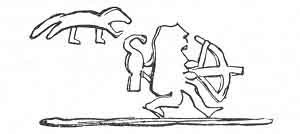
FOX, HUNTSMAN, AND FALCON--From a stone at Shandwick.--Sculptured Stones of Scotland Pl. xxvi.

FOX, HUNTSMAN, AND FALCON--From a stone at Shandwick.--Sculptured Stones of Scotland Pl. xxvi.
From Hector Boyd, who learnt it from one John Campbell, who died three years ago, at the age of thirty-Sept. 20, 1860.
THE fox was once going over a loch, and there met him a little bonnach, and the fox asked him where he was going. The little bonnach told him he was going to such a place.
"And whence camest thou?" said the fox.
"I came from GEEOGAN, and I came from COOAIGEAN, and I came from the slab of the bonnach stone, and I came from the eye of the quern, and I will come from thee if I may," quoth the little bonnach.
"Well, I myself will take thee over on my back," said the fox.
"Thou'lt eat me, thou'lt eat me," quoth the little bonnach.
"Come then on the tip of my tail," said the fox.
"Oh! I will not; thou wilt eat me," said the little bonnach.
"Come into my ear," said the fox.
"I will not go; thou wilt eat me," said the little bonnach.
"Come into my mouth," said the fox.
"Thou wilt eat me that time at all events," said the little bonnach.
"Oh, I will not eat thee," said the fox. "At the time when I am swimming I cannot eat anything at all."
He went into his mouth.
"Oh! ho!" said the fox, "I may do my own pleasure to thee now. It is long since it was heard that a hard morsel is good in the mouth of the stomach."
The fox ate the little bonnach. Then he went to the house of a gentleman, and he went to a loch, and he caught hold of a duck that was in it, and he ate that.
He went up to a hill side, and he began to stroke his sides on the hill.
"Oh king! how finely the bullet would spank upon my belly just now."
Who was listening but a hunter.
"It will be tried upon thee directly," said the hunter.
"Bad luck to the place that is here," quoth the fox, "in which a creature dares not say a word in fun that is not taken in earnest."
The hunter put a bullet in his gun, and he fired at him and killed him.
See Chambers' Popular Rhymes of Scotland, 1858, 231.
See also Wolf's stories, where a wolf prays to Odin that an axe may fall on his head, and a man throws one.
Gaelic omitted
...
...
...
...
...
...
The following two stories, LXVII. and LXVIII., were got in Islay from an old man, whose name has not been sent to me. They were written by Mr. Carmichael, an enthusiastic Highlander, and a good Gaelic scholar, who was stationed in Islay in July 1860, and is now, 1861, at Carbost in Skye.
The main incidents of these stories are quoted in the introduction, as known in the Isle of Man.
The Feinn (Fane) are here found in the spot where the Lay of Diarmaid left them, stationed near the old "Pictish towers," opposite to the Isle of Skye, and they next appear in Islay, where the forging of Fionn's sword, "the Son of Luinne," is a well-known legend. The incidents are told in the Isle of Man of a baron, and the scene is partly Drontheim. Fionn's patronymic, by a change from the common spelling which hardly changes the sound, here becomes MacDugald, or the son of Black and White; another slight change would make it MacDonald. And thus the most numerous clans of the West Highlands, the MacDonalds,
[paragraph continues] MacDugalds, and Campbells, seem all to have something to do with MacCumhal and his men, who may have been Irish warriors, or Celtic gods, nevertheless; for nearly all these West country traditions point back to Eirinn; and the deeds of the Feinn are not always those of mortal men.
There is a curious poem of twenty-six verses about the smithy "Ceardach MhicLuin," in Gillie's Collection, 1787, p. 233. Several of the phrases in the story are in the poem, and the incidents are much the same. I have often heard that a number of poems were collected in Islay by a minister, and published, and verses about the forging of Fionn's sword are still repeated there. Probably the poem is the one of which I have heard.